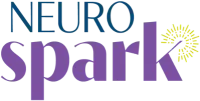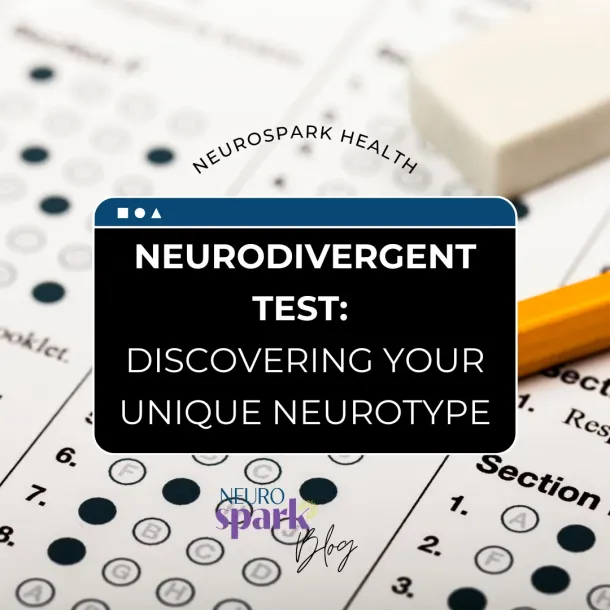NeuroSpark Health Answers: My Best AuDHD Advice

Table of Contents:
When it comes to neurodiversity-affirming care, lived experience is invaluable. It is important to amplify AuDHD voices from individuals (and therapists!) in our community. It’s helpful for you to navigate your journey and know you’re not alone. So we decided to invite our own NeuroSpark Health team to share the best advice they’d give others and what they wish they’d known sooner.
Meet NeuroSpark Health’s Team
Jennifer

I’m an ADA Accommodations Consultant and Career Coach, equipping neurodivergent individuals with tools for advocacy, accommodations, and finding a career fit that works for your brain and body. I am a queer, fat, gender expansive, late-identified (in my 40s!) Autistic-ADHDer with dynamic disabilities committed to advancing inclusion, belonging, and liberation through a neurodivergent-affirming and somatic abolitionist lens. I spent 15 years practicing as a licensed complex systems trauma therapist before retiring in 2022 and moving fully into consulting and coaching.
Cat

I am a Licensed Social Worker and coach currently living in Indiana. As someone who has spent the majority of their life feeling like there is something “wrong” with them, discovering that I am autistic and ADHD has not only been a relief but also an incredible journey of self-exploration and self-love. My life experience has spurred my passion for uplifting neurodivergent individuals, and I hope to make a difference in the lives of those who feel misunderstood, burnt out, and invalidated.
Laurel

I am a late-in-life diagnosed AuDHD therapist. My very real difficulties in life were often denied because I received good grades and appeared to be so functional. But it was at the expense of my calm, well-being, and even physical health. I found my place and my spark in dancing Argentine Tango and singing opera! I am committed to helping others find what works for them, too.
Lex

I’m a licensed clinical social worker and trauma therapist based in New York City. I’m queer, transgender, chronically ill, and autistic. I specialize in working with folks with stigmatized behaviors and identities, or who are otherwise mistreated and ignored in traditional mental health settings. If you’re learning to safely unmask your neurodivergent self, exploring your gender identity or sexuality, examining your substance use, or navigating non-traditional relationship structures like ethical non-monogamy, polyamory, BDSM, or queerplatonic dynamics, I’d love to work with you!
Dani

At my core, I am an advocate and ally to all people who exist outside of the norm. As a neurodivergent woman, raised by a neurodivergent mother, working with this community isn’t just a niche for me, it’s my life. My multiple disabilities and intersectionalities unquestionably shape who I am and how I treat people.
What is one piece of advice you would give to someone who thinks they might be AuDHD?
- Trust your gut and follow your hunch. Your experience is valid, and you deserve to know your own brain! – Jennifer
- You might feel like a walking contradiction, but that doesn’t mean your experience isn’t real or isn’t valid. There are lots of people like you who relate! – Cat
- If it resonates with you, that is valid in and of itself. Only you are an expert on yourself and your experiences. – Laurel
- Try to handle yourself with as much gentleness, grace, and curiosity as possible as you explore your neurotype. The barrier between Autism and ADHD is more fluid than you might think. In the right environment, your challenges could be your greatest strengths. – Lex
- It can feel like a rollercoaster, but there are things you can do to find a balance that feels more sustainable for you. – Dani
What’s one thing you wish you had known in childhood as an ADHDer?
- I wish I would have known that my brain is just different, that I’m not a fundamentally broken and failed human. – Jennifer
- I wish I had known that there isn’t something inherently wrong with me and that all of my experiences will be explained and make sense – Cat
- I wish I would have known that I wasn’t broken and no amount of pushing myself would “make it better.” – Laurel
- I wish I had known that I didn’t need to be academically successful, well-behaved, and entertaining to be worthy of love. – Lex
- I wish I would have known that it was totally okay if my sensory preferences and social battery changed from day to day. – Dani
What’s one thing that has helped you in your AuDHD journey?
- Learning that I’m AuDHD has been absolute liberation! It suddenly became easier to be kind to myself, to honor my limits, and to accommodate my needs because I realized the narrative I was given that I’m “lazy” or “too much” was a total lie, and I didn’t have to live by that story anymore. -Jennifer
- Allowing myself to recognize that there are things that I simply cannot do, and that’s ok, has been hugely liberating. Before I knew I was AuDHD, I would just push through my body screaming “NO!” Now, I know that I can rest – Cat
- The concept of a social battery has made me realize that my energy is a finite resource, and pushing through it will lead to burnout. – Laurel
- I read a ton of books on the Mad movement and disability justice when I was figuring myself out. I wanted to understand the sociopolitical underpinnings of neurodivergence – why are certain experiences considered “disordered” and who gets to determine that? Why are we all exhausted and in pain all the time? How do we unite together to build a world that truly honors our needs and cares for each other here and now? – Lex
- The single most important change I have made to accommodate my AuDHD is to honor my capacities and check in with myself frequently to make sure I prevent burnout (as much as possible) before it happens. This includes learning to say “no” when I am getting overextended. – Dani
What’s one of the biggest misconceptions about AuDHD?
- One of the hardest things for people to understand about late-identified, high-masking AuDHD is that it is actually disabling, and dynamically so I may have capacity to do something one day that another day I just cannot. I want people to believe me when I tell them about my limits, my needs, and my abilities. I am the expert of my own lived experience. – Jennifer
- We’re not using it as an “excuse,” we are oftentimes disabled by aspects of our neurotype and the way the world operates. Things that are easy for you are completely exhausting for us. It’s not easy. – Cat
- That people “don’t look” AuDHD when in reality, they have been masking all along. – Laurel
- Self-diagnosis is completely valid! – Lex
- One thing that people don’t understand is that your relationship with special interests can really vary with AuDHD. – Dani
What’s an aspect of AuDHD that you have come to appreciate?
- I have reclaimed the term “defiant” from negative feedback I’ve gotten throughout my life to be something I truly admire about myself. I appreciate that I am someone who goes against the norms in pursuit of the truth. When I was first exploring my neurodivergent identity, I was telling a friend about it, and my brain spontaneously replaced “neurodivergent” with the word “neurodefiant,” and I have loved embodying that ever since! – Jennifer
- I appreciate that my rigidity, passion, and special interests make me an advocate for social justice and societal change. I love my pattern recognition and how it allows me to see the connections of injustice in the world. – Cat
- I like that I can relate to others’ experiences and have found a home with others just like me. – Laurel
- My pathological demand avoidance (autism) and inattentive traits (ADHD). Questioning authority and dreaming up new worlds is pretty rad. I’ve mostly learned how to wield them both to stir up mischief for the greater good, but the blunders can be pretty entertaining sometimes, too. – Lex
- I like that while I can be quite rigid in some areas (autism), I can also use novelty and spontaneity to keep things interesting and stimulating for me (ADHD). – Dani
💬 We’d Love to Hear From You
Have your own AuDHD wisdom to share? Whether it’s a favorite hack, a hard-won lesson, or just a reminder that others need to hear, you’re invited to join the conversation.
✨ Share your insights in our peer-support Facebook group, or tag us on social media with #NeuroSparkAdvice.
You’re not alone, and your voice matters here.
NeuroSpark Health
One Spark Can Light a Fire
Diagnosis can be the catalyst for significant momentum. It can represent a turning point for your life, where you can move forward equipped with new knowledge about yourself and a new framework to guide you in your journey.
A formal assessment provides an incredible opportunity to gain knowledge about who you are and how you see the world.



